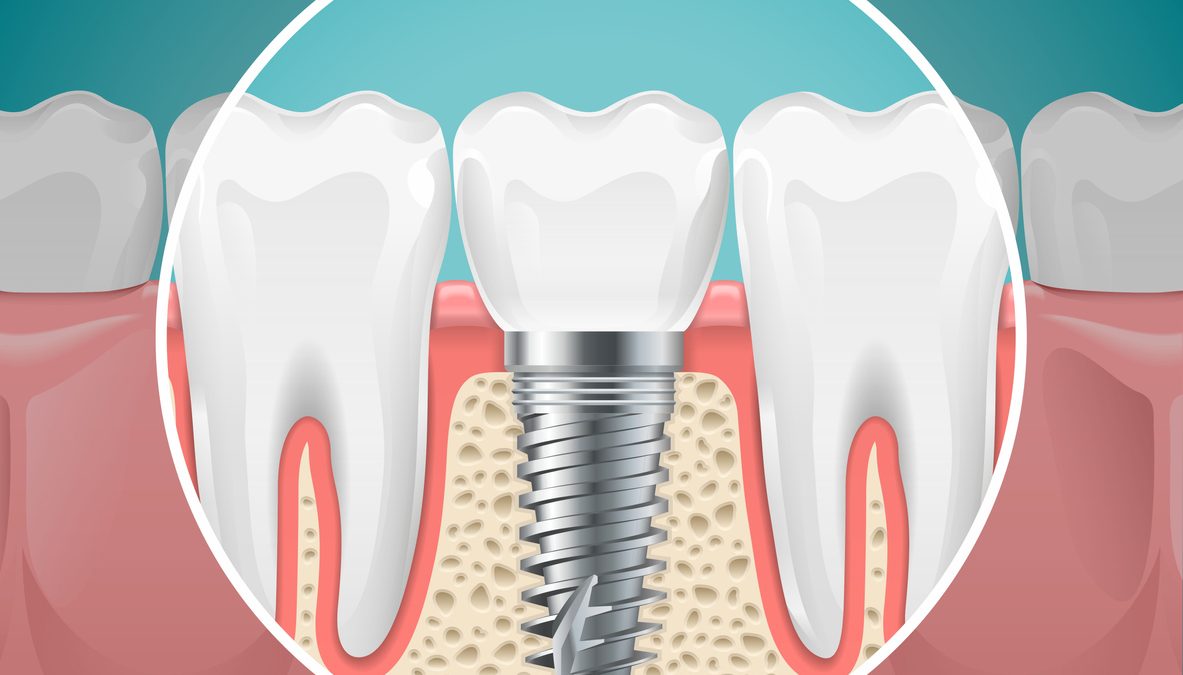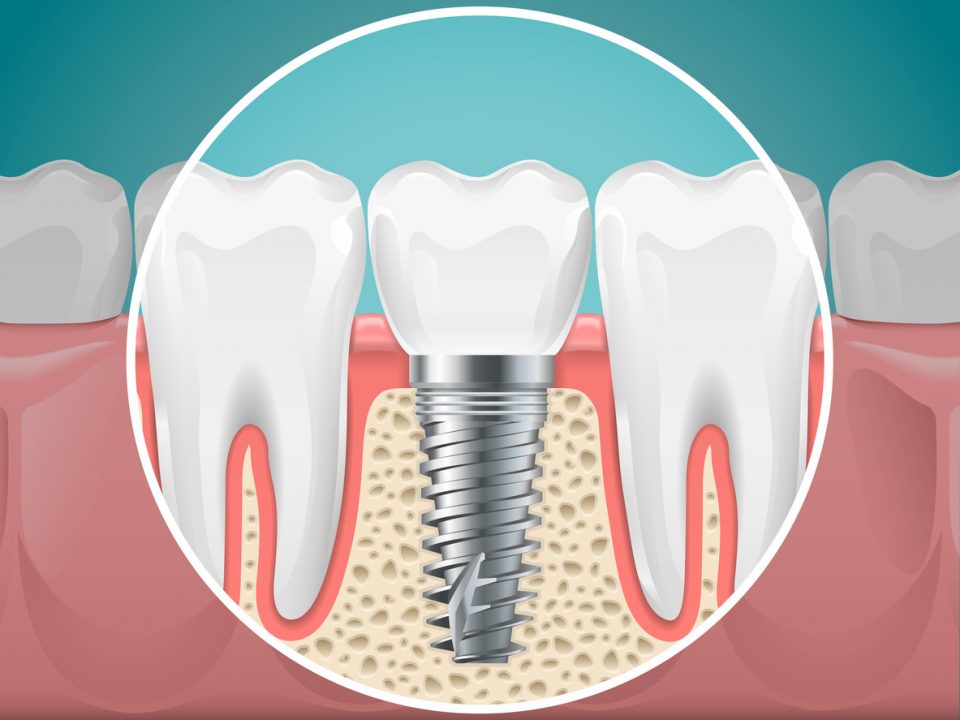
Probiotics for Oral Health
October 26, 2022Millions of people experience tooth loss due to various reasons, such as decay, injury, or gum disease. Replacing missing teeth is crucial, not only for aesthetic reasons but also to maintain proper oral function and prevent further dental problems. When it comes to replacing those missing teeth, there are several options to choose from, each with its own advantages and drawbacks.
This article aims to provide an overview of the most popular tooth replacement solutions, including dental implants, bridges, and partial dentures. We’ll talk about these in a “good, better, best” format so you can understand the pros and cons of each option and make an informed decision about which treatment best suits your needs and preferences. Remember, a consultation with Green Oak Dental is essential to determine the most suitable approach for your unique situation.
Dental Implants (Best!)
Dental implants are a popular and advanced option for replacing a missing tooth or even multiple teeth. In fact, they are the closest possible alternative to a natural tooth. They consist of a titanium post that is surgically placed into the jawbone, which mimics the root of a tooth. Over time, the implant fuses with the bone through a process called osseointegration. Once healed, a custom-made dental crown is attached to the implant, providing a natural-looking and functional tooth.
Advantages of Dental Implants
Natural Appearance: Dental implants closely resemble natural teeth in appearance and function, making them an aesthetically pleasing solution.
Long-Lasting Solution: Dental implants can last a lifetime with proper care and maintenance. They are a more permanent solution compared to other tooth replacement options.
Stabilizes Bone: Since dental implants replace the tooth root, they help maintain the integrity of the jawbone and prevent the bone loss that would otherwise occur with the loss of a tooth.
Drawbacks of Dental Implants
Cost: Dental implants are most expensive than other replacement options, though many patients find the long-term benefits worth the investment.
Surgical Procedure: Implant placement requires a surgical procedure and a healing period, which may not be suitable for all patients or those with certain medical conditions.
Long Treatment Process: The entire dental implant process, from placement of the implant to the crown attachment, can take several months as it requires adequate healing time between stages.
Dental Bridges (Better)
Bridges are a non-surgical tooth replacement option that literally bridges the gap created by one or more missing teeth. Bridges consist of an artificial tooth, called a pontic, which is held in place by dental crowns cemented onto the adjacent healthy teeth. There are different types of bridges, including traditional, cantilever, and Maryland bridges, each with a specific use and application.
Advantages of Bridges
Non-Surgical: Dental bridges are a non-invasive solution for tooth replacement, making them an attractive choice for patients who prefer to avoid surgery.
Quick Treatment: Compared to dental implants, bridges generally require fewer visits to the dentist and have a shorter treatment timeline.
Aesthetic Improvement: A bridge will effectively restore the appearance of your smile by filling in gaps. Though not as natural-looking as an implant, most people will not notice you have a bridge, especially in the posterior (back) teeth.
Drawbacks of Bridges
Alteration of Adjacent Teeth: In order to place a traditional bridge, the teeth on either side of the gap must be shaped to accommodate crowns. Shaping a tooth requires the removal of tooth structure, which can weaken the tooth. This could compromise an otherwise healthy tooth.
Potential Sensitivity: Preparing the adjacent teeth for a bridge may lead to increased sensitivity, especially to hot and cold stimuli.
Less Durability: Although bridges can last many years, they generally have a shorter lifespan than dental implants and may eventually require replacement or repair.
Partial Dentures (Good)
Partial dentures are a removable option for replacing multiple missing teeth. They consist of a gum-colored acrylic base, artificial teeth, and sometimes a metal framework with clasps that attach to the surrounding natural teeth. There are several types of partial dentures, like cast metal, flexible, and acrylic. Each offers varying levels of comfort, durability, and aesthetics.
Advantages of Partial Dentures
Removable: Partial dentures can be easily removed for cleaning, allowing for thorough oral hygiene practices and maintenance.
Low Cost: Generally, partial dentures are more affordable than dental implants or bridges, making them an attractive option for budget-conscious patients.
Replace Multiple Teeth: Partials are an efficient solution for replacing multiple missing teeth within the same arch.
Drawbacks of Partial Dentures
Less Stability: Since partial dentures are removable, they may not provide the same stability and secure fit as implants or dental bridges, which can impact comfort and function.
Discomfort: Some patients may experience initial discomfort or irritation as they adjust to wearing partial dentures, though this typically subsides with time and practice.
Frequent Adjustments: As the shape of your mouth changes over time, partial dentures may require adjustments or relining to ensure proper fit and continued comfort. Since partials do not
prevent bone loss, you’ll likely need to have new partials made over time.
Of course, there is one more option for replacing a missing tooth – do nothing! However, this is the worst option for a multitude of reasons. Failing to replace a missing tooth can cause shifting and crowding teeth, increased bone loss, and even lead to the loss of other surrounding teeth.
Dental implants, dental bridges, and partial dentures each offer unique benefits and drawbacks when replacing missing teeth. Your personal preferences, dental health, and budget will play a significant role in determining the most appropriate solution for your situation.
Our team at Green Oak Dental in Kingwood, Texas, is here to help you make the best decision for your oral health needs. We encourage you to schedule a consultation with our experienced dental professionals, who will guide you through the process and develop a personalized treatment plan tailored to your specific needs. Don’t let missing teeth hold you back from enjoying a confident, healthy smile – contact Green Oak Dental today!


